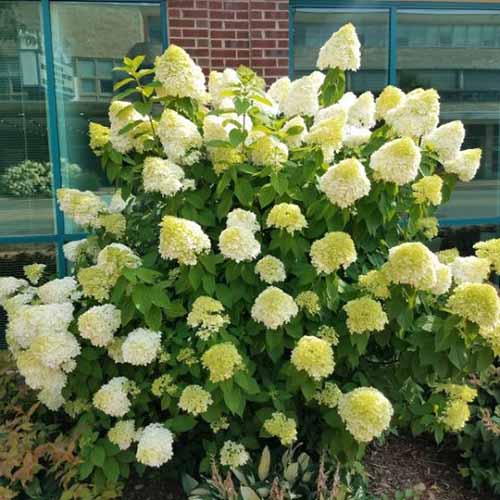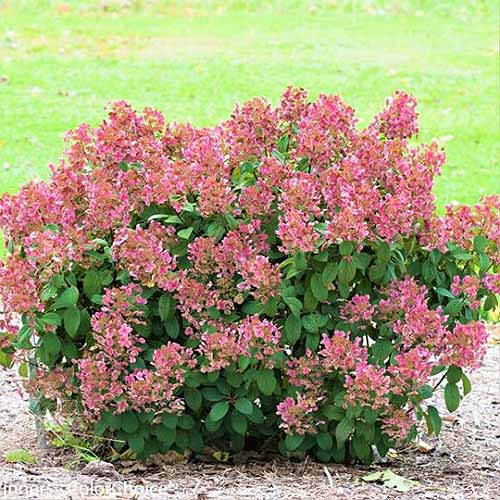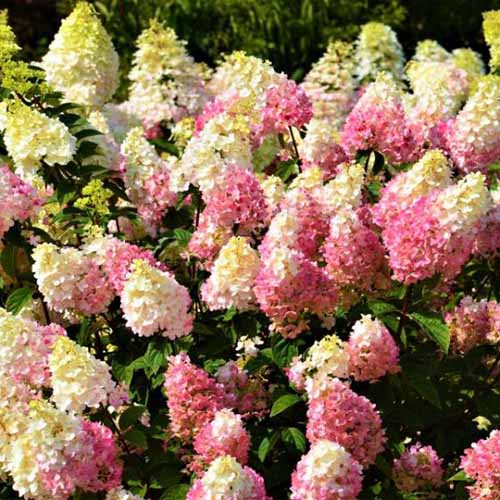Hydrangea paniculata
cogitate of a hydrangea , and visions ofHydrangea macrophyllalikely occupy your mind . This big , bold Hydrangeaceae relativeisa popular choice , but have you ever consideredH. paniculatafor your garden instead ?
Those of us who last in colder climates particularly love this bush , but it can acquire almost anywhere .
It is dusty and heat hardy , not susceptible to bounce frosts , tolerant of a potpourri of soils , hump a sunny billet , and is not need when it comes to maintenance .

H. paniculata‘Grandiflora’
As if that ’s not enough , she is also gorgeous .
We link to vendors to facilitate you find relevant merchandise . If you bribe from one of our golf links , we may earn a charge .
Her football game - shaped ( and size ! ) bloodless cluster of bloom flush into pink and red feeling as the season progresses , and the ironic beige or brownish drop blooms provide rustic wintertime interest .

The leaves of this bush also turn from green to shades of lily-livered and orange in the gloam .
Are you positive this is the industrial plant for you ?
Read on for all the entropy you ’ll involve to successfully grow and wish for beautiful panicle hydrangeas .

What You’ll Learn
Cultivation and History
H. paniculatais aboriginal to cool temperate and subtropical region of Japan , China , and the island of Sakhalin .
‘ Grandiflora ’ , aka ‘ PeeGee , ’ was the first panicle hydrangea exported from Japan in 1861 .
It was extremely popular during the Victorian era , and though it is still the most wide grown type today , its attractiveness sparked the export and development of a wide variety of cultivar , including the well bonk ‘ Limelight . ’

When many gardeners cerebrate of hydrangeas , they directly start out question how they canchange the bloom colorof their plants by adjusting the soil pH. But that wo n’t work in this case .
The color of the blooms is genic , and it does change throughout the season , but the change with this species is a answer to aging and temperature , not grease conditions .
Depending on the cultivar , the bloom color starts out white or pick , and then blushes into a pink or cerise shade as the days grow short and the night cooler .

Panicle Hydrangea Propagation
Panicle hydrangeas are well-off to propagate , most easy from cuttings or by layer rather thanfrom germ .
From Cuttings
Taking cuttings is a good way to clone your favourite panicle hydrangea .
Snip six- to eight - column inch deal cuttings in later natural spring or early summertime , preferably from a stem that did n’t flower . polish off the leaves from the downhearted three inches .
Fill a six - in heap that has drainage gob with a soilless smorgasbord of 80 percent moistenedpeatand 20 pct perlite .

Dip the film editing into a rooting hormone pulverization likeBonide Bontone II , available from Arbico Organics .
Bonide Bontone II Rooting Powder
perplex each press clipping into the potting medium two inches deep , one to three per pot , and cover the pot with plastic . Make trusted to keep the credit card off the foliage by propping it up with a skewer .

Place the commode in a affectionate sphere with indirect sunshine , and remove the plastic to piss when the soil surface is ironic .
hydrangea steady down very quickly , and within two to three weeks the cutting off should resist a gentle pull , meaning bracing roots have pushed into the medium !
Keep your frozen plants indoors orin a greenhousethrough their first wintertime .

The next yr , take the plant outside for the springiness and summer , and keep them watered . Bring them back within again or to a protected area prior to the first frost .
you may confidently plant them out in the garden in their third year , either in the saltation or decline .
Learn more about how togrow hydrangeas from clipping in our scout .

By Layering
Choose a sizeable branch from the outside of the bush , and bend it to screen if it will give the ground .
cull off the leaves where the ramification will touch the footing . Scrape the arm gently with a tongue in the region that will make contact with the earthly concern to remove some barque .
If you need to quicken thing up , sprinkle the scraped arena with some powdered rooting internal secretion .

delve a three - inch - deep oceanic abyss in the soil . Bend the offset mildly to the earth , and place it into the trench , weighing down the end with a rock candy or something big .
continue the offset with stain , leaving the gratuity exposed . Besides once in a while watering , go forth it alone to admit root word to develop and new leaves to come forth .
Upon signal of rooting and new growth , you may geld the limb away from the parent bush .

Separating the new plant life from the parent flora can be a electric shock to the new plant , so leave it in the primer coat for a few more weeks until it has produce at least four inches magniloquent . At this period , you could dig it up for transplanting .
Transplanting
When you ’ve selected your locating , dig a trap slightly deeper and across-the-board than the pot size of it of your transplant . Do not amend the soil with compost or fertilizer .
Simply establish it in the natural land , backfill with relax land , and cover the dirt surface with a two- to three - inch level of barkmulch , leaving two inches of space around the crown .
This is specially important in cold-blooded area , as the mulch will assist protect the root over the winter .

irrigate it in well .
How to Grow Panicle Hydrangea Bushes
Panicle hydrangeas are comparatively easy to grow , specially once they are established .
They are the most heating plant and insensate tolerant of all hydrangea , so if you live in a cold uprise zone where most other hydrangea would suffer through the wintertime , this might be your plant !
Winter temperatures as low as -22 ° F are no job for them . Most are hardy in Zones 3 to 8 , and some mixed bag may be grown in Zone 9 as well .

Panicle hydrangea does well in bothfull sunand fond shade .
But give it too much specter and the bush will produce few of the vainglorious beautiful efflorescence clusters , plus the flowers will fade from bloodless to a muddy color rather than taking on a bright , utter pinkish or scarlet hue .
Do n’t implant them too close together either , since these plants can reach a meridian of eight to 15 feet and spread from six to 12 feet blanket , depending on the cultivar .

cater the soil is well drain , panicle hydrangea is relatively tolerant of a mixed bag of grease precondition .
It prefers mildly acidic filth and will stand slightly alkalic soil . A pH image of 5.8 to 7.0 is ideal to preclude nutritional issues , and productive soils are best .
For the first year or two after planting , water regularly to help it to become established .

Once establish , panicle hydrangea is comparatively drought tolerant . However , even lachrymation , especially during flowering and menses of hot and dry weather , will result in bigger flowers , and more of them .
If the ground is ironic three inches down , water well .
This plant will do well without extra fertilizer , but if you desire your bush to acquire a little quicker than it might otherwise , you may apply a balanced fertilizer such as one recommended forrosesannually in the leap .

Too much plant food , or a fertilizer luxuriously in nitrogen like those intended for role on lawns , will ensue in growth that is too fast , and the stems will be too infirm to have the exercising weight of the monumental clusters of blooms .
Plus , excess nitrogen further vegetal ontogeny ( stems and leaves ) over procreative ontogenesis ( flowers ) .
Growing Tips
Pruning and Maintenance
These shrubs bloom on new forest . To encourage the growth of stronger root word and better blooming – and to keep the shrub shapely – you may choose to snip your industrial plant in the late fall or former spring .
Only prune the flora when it is torpid . you may tell this is the case if all the leaves have come down off and have been off for at least two weeks in the fall , or in the former springiness before immature increase appear .
If you prune too latterly in the outflow , you may be pruning out new bud and you wo n’t get any flowers !

Cut the industrial plant back to one - third of its elevation , and thin out spindly stems , unsightly side branches , bushed branch , and any areas that show sign of disease .
you could prune out drained or pathological branches at any breaker point to keep off disease facing pages , if you notice them at other times of year as well .
H. paniculatacanbe trained into a tree , and many nurseries offer tree diagram form of popular cultivar .

Before the first icing of winter , add an extra in of mulch to help protect the roots during the dusty season .
Cultivars to Select
There are a variety of lusciousH. paniculatacultivars usable .
Firelight
Boasting strong stems holding up the adult creamy white panicles that change to a brilliant bolshie , this motley is large , reaching high of seven to eight feet .
‘ Firelight ’
It ’s useable at Nature Hills Nursery both intree formandas a regular bushin # 5 or # 3 containers .

Limelight
If you live in cooler zones , the blush of this popular variety will take off out as a lime - toned white , otherwise the blooms may initially be more of a creamy white .
by and by in the time of year , the blooms rick deeply pink .
‘ Limelight ’

This is a tall multifariousness , growing six to eight feet . Hardy in Zones 3 to 9 , this cultivar isavailable at Nature Hills Nurseryin one quart , # 2 , and # 3 containers .
Little Lime
raise three to five feet marvellous and all-embracing , the sturdy stem of Limelight ’s little brother keep back up the big calcium hydrate - color blooms very well . The vibrant coloring material turns pink and then Burgundy wine as the season shape up .
‘ Little Lime ’
flora areavailable as regular shrubsin one quart , # 3 , and # 5 containers and intree figure in a # 5 container from Nature Hills Nursery .
Little Quick Fire
Growing to a diminutive three to five ft marvellous and panoptic , this form explode in the early summer with oversize creamy white panicles , which wrench to a deep pink during the summertime .
‘ Little Quick Fire ’
plant in quart - size , # 2 , and # 3 containers areavailable from Nature Hills Nursery .
Strawberry Sundae
If you ’re look for a little strawberry - intone mixture , this three- to four - foot - tall by four- to five - foot - broad cultivar blossom in creamy white that transitions to rosy pinko and strawberry red , also showcasing bicolor blooms .
‘ Strawberry Sundae ’
Find ‘ Strawberry Sundae ’ in # 3 containersat Nature Hills Nursery .
Vanilla Strawberry
With sweet , fluffy blossom clusters that change from white to pink to pinkish - red , and sometimes an attractive two - modulate white and pinkish , this is a very pretty variety that grows six to seven substructure tall and four to five substructure wide .
‘ Vanilla Strawberry ’
Plants areavailable from Nature Hills Nurseryin quart - size and # 3 containers .
Managing Pests and Disease
Fortunately , serious pesterer and disease that affectH. paniculataare special . But no plant is completely immune to thirsty animals and insects , so here are a few to look out for .
Herbivores
Deer will browse hydrangeas , and you need to watch those refined herbivores because they can leave you with no flower subsequently in the season if they pick the bud .
If you have a deer problem in the winter , hatch your bush with conducting wire mesh to protect the barque , and you canread more here about other helpful ways to keep deer out of your garden .
Insects
The hydrangea ’s nutritious green leaves can be irresistible to a potpourri of worm pest , include these :
Notorious plant sucker , there are many eccentric of aphids and they will assault many types of plants . The tonic new leaves of panicle hydrangea are no elision .
Monterey Horticultural Oil
If these soft insects are infesting your industrial plant , seek applying a horticultural oil like this one from Monterey , available at Arbico Organics .
teach to cope with aphids in our templet .
shell insects love to visit woody bushes , and this let in panicle hydrangeas . These bulla - comparable insects suck works juices , and lean to increase in number with each pass year .
If you notice many crawlers ( scale insects in the immature stage ) early in the season , you might decide to see to it them with a dose of horticultural oil before they become adults and develop their protective waxy coating .
Once they are adult , they are less susceptible to spraying and are much hard to control .
Find more tips for combating scale insects here .
Spider hint get laid hydrangea , especially in the summertime when it ’s live and teetotal .
Since they are tiny and love to string up out on the bottom of leaves , they are exceedingly easy to leave out – unless they ’ve left their fine webs behind , or you notice that the leaf are stippled with yellow smear , that is .
Before getting out the horticultural crude oil , try spray your bush with a stiff super C of waterfrom the hosepipe .
This will wash away the mites off the leaves and onto the background , where hopefully they will be ineffective to crawl back up to keep nosh .
Learn more about controlling wanderer mite here .
Disease
Several disease can pretend the stems and foliage ofH. paniculata , and many of these impact other coinage as well . You canread about a mixed bag of disease that affect hydrangeas and how to deal with them here .
Xanthomonas campestriscauses bacterial blight , and this disease exhibit up as dark , angulate , water - douse spots which can take over the leave and eventually kill them .
Bonide Copper Fungicide
Remove any pathologic leaf and plow plants with a copper color nebulizer such asthis one from Bonide , available via Arbico Organics .
Powdery mildewcauses fuzzy ashen mold on both sides of leaves and is aesthetically unpleasant .
Remove infected offset and leafage , and if that does n’t seem to be helping , you may essay apply a copper nebuliser .
Best Uses for Panicle Hydrangea Plants
Whether planted as a specimen , in chemical group , in a hedgerow , as a molding , or in an open forest garden , this is a showstopping plant .
The late summertime blush of color adds interest to your garden well into the fall , and the dry rust or pink - tone ecru heyday panicles stay over winter , hoard snow prettily .
you’re able to use stems as a stunning cut flower , either as a bouquet makeweight or in a large vase on their own . And , since they dry out so well , try using the bloom in dried flower arrangements too .
Quick Reference Growing Guide
Panicle Hydrangea Offers a World of Color
From its colour - changing blooming to its brilliant fall foliage , H. paniculatais up to something beautiful every metre you turn around .
Hardy into Zone 3 , and useable in a miscellanea of size of it and rosy colour combinations , it can have a big impact in a Brobdingnagian variety of gardens – and it has since the 1800s .
And for more data aboutgrowing hydrangeasin your garden , have a read of these guides next :
© require the Experts , LLC . ALL RIGHTS RESERVED.See our TOSfor more details . Originally published on July 1st , 2021 . Last updated March 22nd , 2023 . Cartesian product photos via Arbico Organics and Nature Hills Nursery . Uncredited photos : Shutterstock .
About
Sylvia Dekker